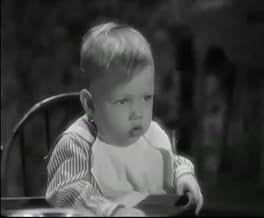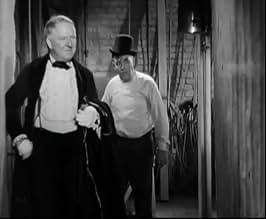Füge eine Handlung in deiner Sprache hinzuThe Great McGonigle and his troupe of third-rate vaudevillians manage to stay one step ahead of the bill collectors and the sheriff.The Great McGonigle and his troupe of third-rate vaudevillians manage to stay one step ahead of the bill collectors and the sheriff.The Great McGonigle and his troupe of third-rate vaudevillians manage to stay one step ahead of the bill collectors and the sheriff.
- Auszeichnungen
- 2 wins total
- Girl in Audience
- (Nicht genannt)
- Mr. Livingston
- (Nicht genannt)
Empfohlene Bewertungen
Here is W. C. Fields in all of his pompous, vulgar glory: evasive, duplicitous, sneaky - utterly wonderful. Delivering dialogue in his unique buzz saw rasp, he gives out so many familiar lines that at times he almost seems to be performing a self-parody. This film brilliantly shows why Fields needed the sound cinema to let him be fully appreciated, and with Paramount giving him free rein to develop his material as he wished, it is not surprising that the film is a classic. Fans need look no further to find the essential Fields.
The romance between Judith Allen & Joe Morrison is a rather dull affair, although the young man sings well. Tammany Young plays Fields' loyal amanuensis. Movie mavens will recognize comedian Billy Bletcher as the tomato thrower & sour-visaged sheriff Clarence Wilson, both uncredited. Legend has it that Hollywood's first movie star, Florence Lawrence, derelict & forgotten, made one of her last unbilled appearances here before her 1938 suicide.
Fields found it useful to populate his films with at least one she-dragon, a female of frightful aspect against whom he could bounce off some of his best humor. This film has two: rail-thin, Nora Cecil - prim & dour as the troupe's suspicious landlady; and most especially silly Jan Duggan, horridly bejeweled & curled, as Field's wealthy target. Here was an actress, now nearly forgotten, who could easily equal in hilarity even Fields himself. It is generally overlooked how important her contribution is to the celebrated supper table scene with Fields & Baby LeRoy - one of the funniest sequences ever to appear in an American film. And her rendition of `Gathering Up The Shells On The Seashore' is a wonderful spoof of such sentimental songs as `When You And I Were Young, Maggie,' which were so popular in that era. Miss Duggan would return to briefly plague Fields in three additional films, including THE BANK DICK (1940). (She died in 1977 at the age of 95.)
Fields has included the old melodrama The Drunkard into the plot and to his credit he plays it straight,' letting its honest antique sentiment speak for itself. In his own private olio, Fields makes a curtain call to show off his astonishing talent of legerdemain. It is wonderful to have his routine captured on film as he really is quite amazing - it is easy to see how at one time he was considered the world's greatest juggler. Now he is remembered as one of cinema's supreme comics.
The film, as such, relies more on atmosphere than the typical Fields 'sketches' and this, perhaps, lends it a charm - and a freshness - that it wouldn't otherwise possess. Among its many notable scenes are: Fields thinking the military reception waiting at the train station is for his troupe's benefit; the dinner sequence with a rampaging, famished troupe and Fields' hilarious encounter with Baby LeRoy (who throws food at him and drops his watch into a jar of molasses) - Fields manages to get even with the child by kicking him when no one's watching!; the rich old lady's cringe-inducing singing audition, with the star reacting accordingly (he's hoping to secure her financial backing for the play the troupe will be presenting in town by promising her a role in it - this is eventually whittled down to a single line, which she's never even called upon to deliver!); Fields falling off the stage during rehearsals, etc.
"The Drunkard" set-piece occupies a good deal of the second half: a hoary melodrama which the troupe performs with gusto - with Fields as the mustachioed and hissable villain of the piece who, at one point, reprises the immortal line from his short THE FATAL GLASS OF BEER (1933) "'T ain't a fit night out for man nor beast". With the closing of each act, the curtain comes crashing down making a loud thumping sound; still, the film is clearly intended as a valentine to the days of vaudeville - and even includes a wonderful juggling routine towards the end that showcases Fields' amazing dexterity (in spite of his advancing age, corpulent physique and propensity for booze).
The final sequence finds The Great McGonigle keeping busy as a medicine showman - having left his daughter behind, so as not to interfere with her happiness alongside a stage-struck boy emanating from a respectable family. Typically, for comedies from this era, romance and songs have been incorporated into the narrative as much as a device by which to counterbalance the star's antics as for purely commercial reasons (since these films were largely intended for family consumption).
This is a period film and it goes back to the turn of the last century right about the time when a young juggler named W.C. Fields was going into vaudeville. The Old Fashioned Way offers us a rare treat to see Fields doing the juggling act which he started in show business with. I'm sure Fields drew from his experiences way back when to both write the original story on which the film is based and to give his usual good performance.
The film has a musical score of mostly old public domain standards, but the songwriting team of Mack Gordon and Harry Revel wrote a couple of original songs for the film. Gordon and Revel were with Paramount at the time, but would soon move to 20th Century Fox where they wrote a number of songs Alice Faye introduced. Morrison has a nice tenor voice and a pleasing, but somewhat limp personality. He does the best known song from the film, Poor Folk well with his tenor, but I have a bootleg radio recording of Russ Columbo doing it on one of his radio shows. Russ's baritone is far more suitable to the number than Morrison's tenor.
Still the show in this film is Fields and no one comes near stealing this film from him. Actress Jan Duggan plays the rich spinster who has stage ambitions and who Fields courts relentlessly, even putting himself through the torture of hearing her sing a really stupid song about gathering sea shells. Duggan would play Bill Fields's foil in several more film after The Old Fashioned Way.
Fans of the eternal Fields will like The Old Fashioned Way and if you see it you'll become a fan of W.C. Fields.
Wusstest du schon
- WissenswertesW.C. Fields recreates his famous vaudeville juggling routine with the cigar boxes.
- PatzerBetty is described as the leading lady of the troupe--as one would expect, since she is The Great McGonigle's daughter. But she takes no part in the show; another actress plays the female lead.
- Zitate
Dick Bronson: Mr. McGonigle, I've got to have some money.
The Great McGonigle: Yes, my lad, how much?
Dick Bronson: Two dollars.
The Great McGonigle: If I had two dollars, I'd start a number two company.
Dick Bronson: For two cents I'd quit.
The Great McGonigle: [to Marmaduke] Pay him off!
[Marmaduke gives him a two cent stamp]
- Crazy CreditsThe end credits are in 2 parts; the first contain the actors and their character names in the film as a whole; The second contains the actors and their character names in the play, "The Drunkard." Five actors, therefore, are credited twice: W.C. Fields, Joe Morrison, Judith Allen, Samuel Ethridge and Ruth Marion.
- VerbindungenFeatured in Hollywood: The Gift of Laughter (1982)
- SoundtracksWe're Just Poor Folks Rolling in Love
(1934) (uncredited)
Lyrics by Mack Gordon
Music by Harry Revel
Sung by Joe Morrison
Top-Auswahl
Details
- Erscheinungsdatum
- Herkunftsland
- Sprache
- Auch bekannt als
- Die gute alte Zeit
- Drehorte
- Produktionsfirma
- Weitere beteiligte Unternehmen bei IMDbPro anzeigen
- Laufzeit
- 1 Std. 11 Min.(71 min)
- Farbe
- Seitenverhältnis
- 1.37 : 1































